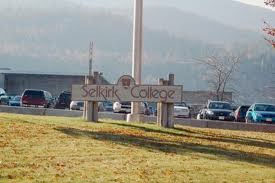Selkirk College staff work hard to balance budget
No new provincial dollars has Selkirk College staff scrambling to find an expected million-dollar shortfall in the budget for the next academic year.
The recent provincial budget confirmed that the funding levels for college operations throughout B.C. for the coming year would remain unchanged.
However, those funds will then be reduced over the successive two years.
“If one takes into account the combined effect of receiving fewer dollars, and at the same time having to deal with inflationary increases in the costs of operation, it is easy to understand the significant challenges,” Neil Coburn, Selkirk’s VP Education and Students said in a written release.
Coburn said every year Selkirk College must find savings in order to present a balanced budget to the provincial government, and “this year will be no different.”
However, the college has been put under the gun by new government directives.
According to Coburn, the current shortfall amounts to more than a million dollars.
“After years of trimming to cover budget shortfalls there are no longer any easy solutions,” Coburn explains.
“Given the size of the shortfall and the fact that approximately 75% of the college budget applies directly to the delivery of student programs and services, the necessity to find savings in that area is unavoidable.
“To this point the college has been able to find two thirds of the overall savings in the operational and administrative areas of the college. However, some programming will be affected.”
Director of Communications, Barry Auliffe told The Nelson Daily last year’s budget at Selkirk College is approximately $36 Million, for which $25-26 Million is funded from the Ministry of Advanced Education and remainder through student tuition.
College staff has worked feverously to reduce costs by capital refinancing, reducing travel costs, improved operational efficiencies, the elimination of certain management positions and early retirement.
But Auliffe said unavoidable cuts would be made in some student programs.
“Courses that will be dropped include the second-year science programs,” Auliffe confirmed.
“It’s interesting to note that when Selkirk started in 1966 there were only three degree granting universities in B.C. and a lot of the students would go to the college for the first and second year before transferring for the third and fourth years,” Auliffe added.
“Now there are 12 degree-granting universities — Thompson Rivers (Kamloops) and UBCO (Kelowna) and there’s a way more opportunity for students to find space in their second year.”
Selkirk is remained committed to maintaining a high quality program of first year arts and humanities and science courses and second year arts and humanities courses since these areas have enrolments that are continuing at a healthy level.
Other reductions will come at Kootenay School of the Arts by offering one-year certificates in clay, fibre, jewelry and metal.
Golf Club Operations Online or “GCOOL” is a unique online golf management program that will now only be offered if enrolments are sufficient to cover all costs.
Auliffe said staff must bring a balanced budget to the Selkirk Board by the end of March — the conclusion of the current fiscal year.
Selkirk College employs a staff of approximately 500 full or part time.


























Comments